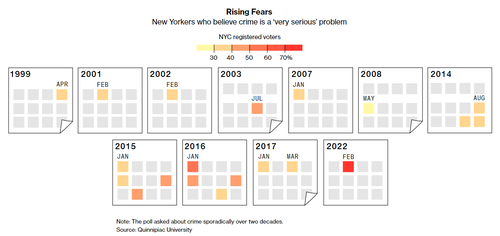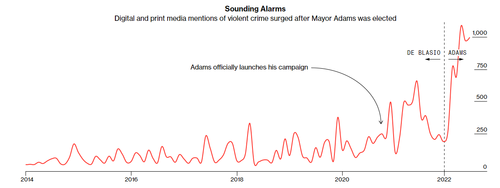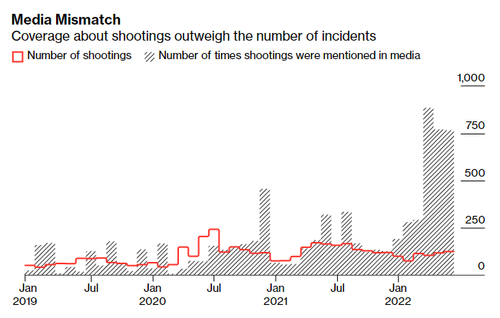When one looks at New York City's recovery from the pandemic lockdowns, it's hard to make the case that things are going swimmingly. The city is re-opening at a snail's pace, with some blocks (like the recently profiled block near the 59th St. subway) still "frozen" in peak-pandemic time.
And one of the key factors preventing the city from re-opening in a timely fashion has been the crime and the environment of criminal activity that has lingered since the days of the pandemic lockdowns and "peaceful protests", where many U.S. cities were nearly burned to the ground.
As outlined in a new profile of the city by Bloomberg, violent incidents in New York have been in focus, emboldened by the hands-off law enforcement policies of Bill de Blasio and his administration over the last half decade.
Police in many major cities feel like they can't do their jobs with Democratic leadership in place and citizens of said cities are continuing the exodus to the suburbs that started at the beginning of the pandemic.
While Bloomberg is quick to spin that "incidents of violent crime remain at historic lows in New York City", they also point out that numerous "high-profile incidents in subway stations and tourist hubs" have left a bad taste in people's mouths when it comes to public safety. Young New Yorkers are seeing crime rise, instead of fall, for the first time in their lives, the report notes.
And there's no doubt crime is in focus among those who live in New York, so something must be compelling citizens to take the issue far more seriously than they did several years ago.
In fact, about 75% of citizens said crime was a “very serious” problem in a February Quinnipiac University poll, marking the highest number since 1999.
Crime in many major U.S. cities started to pick up as a result of the economic consequences of locking down, mixed with the riots and "protests" that took place after the George Floyd incident.
"Washington D.C., Los Angeles, Chicago and other US cities saw murder rates climb to the highest point in over a decade, driven by gun violence," Bloomberg reported. It has caused many businesses - like Ken Griffin's Citadel - to abandon these cities and move to states like Florida and Texas.
Crime has gotten so bad, it has also become a political talking point. Newly elected New York City Eric Adams was widely supported for his background in law enforcement and his willingness to give ground on reforming how policing is handled in the city.
Lisa Miller, a political science professor at Rutgers University, commented: “We didn’t see people using crime [politically] at the local level a whole lot over the past 10 to 15 years because crime levels were historically low. What politicians do and whether they’re successful at it depends on how much people are generally frightened about walking around their communities.”
The article then goes on to question whether perception truly is reality, pointing out how media coverage surrounding crimes has changed and asking whether or not giving a bigger megaphone to the issue has created more of a problem than it is solving.
The fact remains, however, that many younger generations in New York are seeing crime rise for the first time in their lifetimes. And the election of Eric Adams speaks to what is likely going to become a trend around the country: voters in cities are telling politicians that they demand law and order.
But John Gramlich, who studies crime statistics at the Pew Research Center, concluded that it was all about perception: “If somebody feels unsafe, they’re probably not going to be comforted by the fact that overall crime in New York is lower today than it was 20 years ago. The feelings are important because it can translate into how people ultimately choose their leaders or vote on policies.”



No comments:
Post a Comment
Note: Only a member of this blog may post a comment.